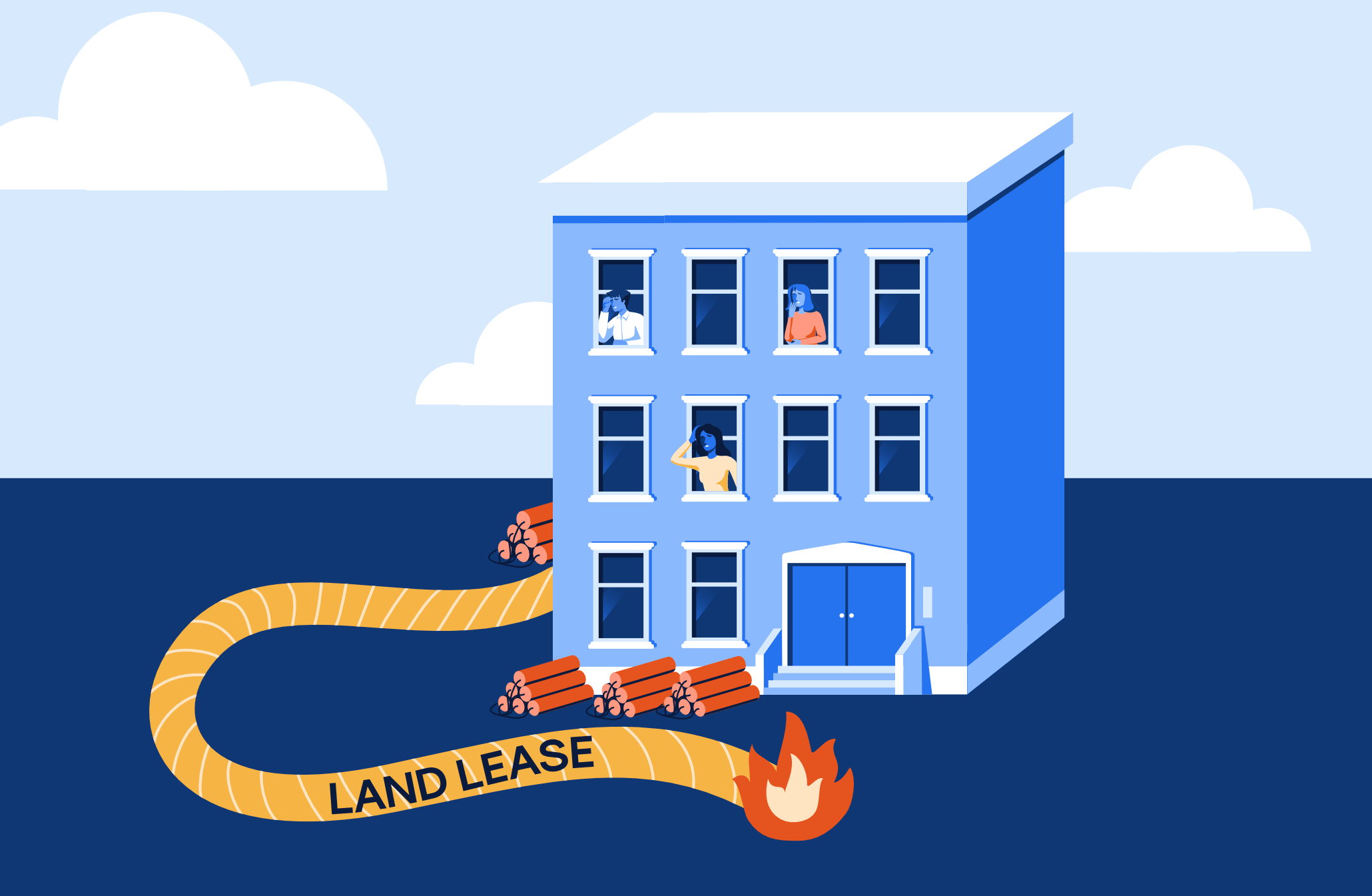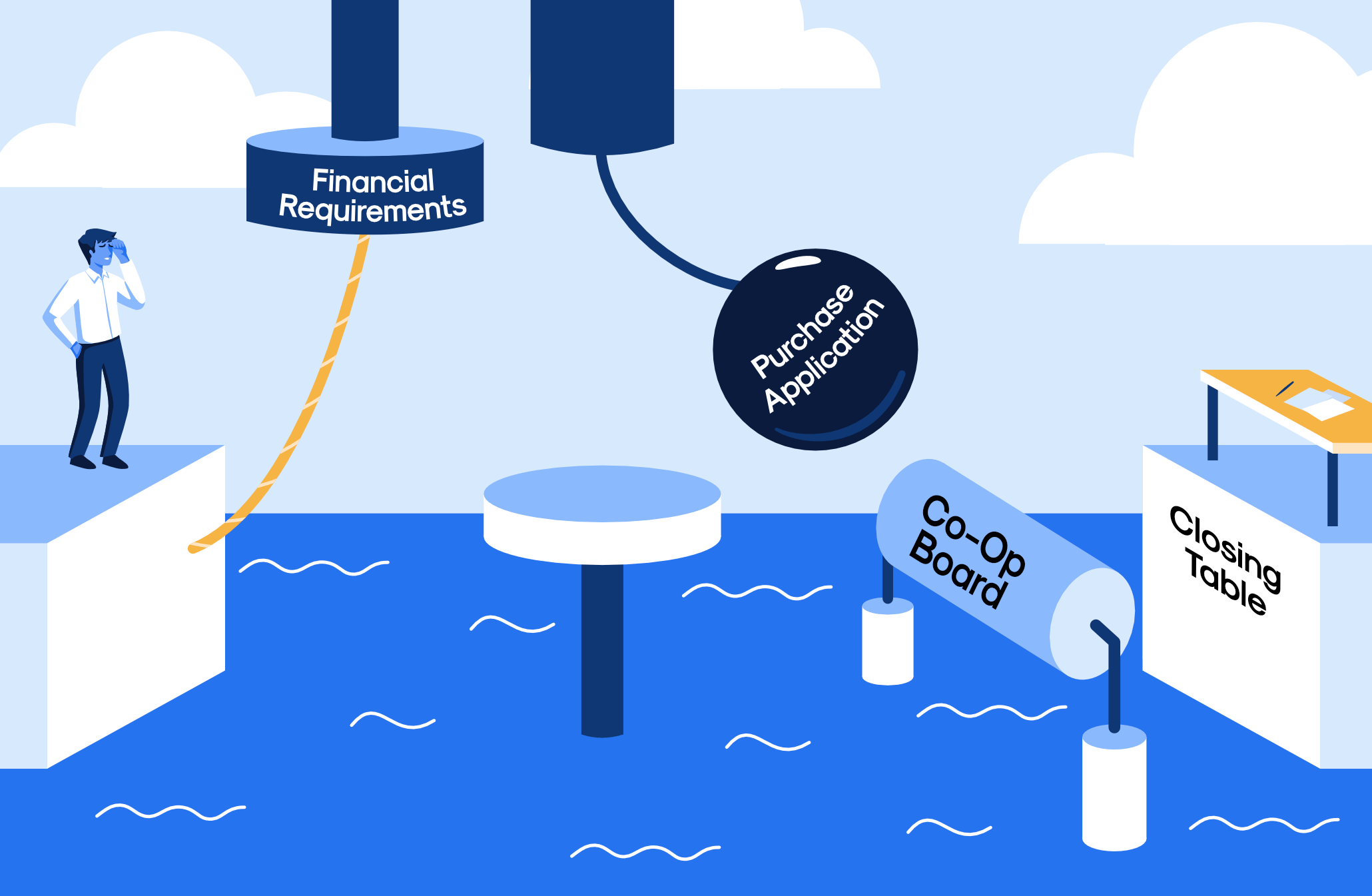While searching for an apartment, buyers sometimes find a listing that’s too good to be true. It’s very similar to all the others except it’s dramatically cheaper. Upon further review, they notice the maintenance is much higher than other listings. What’s going on?
Chances are, they’re dealing with a land lease. What is a land lease, why do they exist and how do they affect apartment owners in New York City? These are all extremely important questions for anyone considering a building with a land lease.
What Is a Land Lease In NYC?
Land leases are also called "ground leases" - there is no difference between the two. A land lease is exactly what it says - a lease of the land. While the vast majority of NYC buildings own the land underneath, there are about 100 land lease properties in the city. In these situations, the building’s owners own the building but rent the lot underneath.
Usually, the leases are the result of a landowner who wants income from the property instead of selling it outright. You can find land leases in both co-op and condo buildings but they are more common in co-ops.
Land leases tend to have very long term lease agreements - at least a few decades and they can go well over 100 years. The recent new development at 70 Charlton Street is on a 145 year land lease.
Since the building does not own the underlying land, it must make rent payments to the land’s owner. These payments are included in monthly maintenance fees or common charges. As an incremental expense compared to a normal building, these payments will be higher in a land lease building.
What Problems Arise From A Land Lease?
There are two very big obstacles a buyer of a land lease building needs to overcome.
First are higher monthly payments. As we just mentioned, that additional land lease payment needs to be made each month. Monthly charges on a land lease building are often significantly higher than other apartments, all else equal. Depending on the land lease, they can even be multiples larger. Just like if you were renting an apartment, all of this money goes to the owner of the underlying land. There is no associated tax deduction nor does the money go to capital improvements - it’s simply a higher monthly payment.
And secondly, land lease buildings have a smaller buyer pool. Even with a lower purchase price (which we’ll discuss below), many buyers simply find the high monthly charges and uncertainty associated with land lease buildings to be untenable.
It often takes a buyer a lot of time to get comfortable with purchasing a land lease. When selling a unit on a land lease, that same discomfort can result in a longer sales process.
Why Might Land Lease Buildings in NYC Be A Good Purchase?
Obviously there must be a silver lining to a land lease. Nobody would buy an apartment with higher maintenance and the land lease ticking all else equal. In order to compensate buyers for those items, purchase prices in land lease buildings are significantly lower than a comparable building. Exactly how much less depends on a host of factors, but we mean significant. 20% or 30% discounts are not unreasonable to expect. If the numbers make sense, an apartment on a land lease can be a great deal
We recently had clients looking at 100 Barrow Street in the West Village. 100 Barrow is one of a few recent new construction projects built on a land lease. The unadjusted two-bedroom maintenance payment is over $10,000 per month. A large portion of that is due to the land lease.
Initially, most buyers would slam the door on such a payment. It’s hard to imagine you own an apartment and still have to pay $10,000 per month just to keep it. However Yoreevo conducted a very thorough analysis of the the land lease, the current unadjusted monthly maintenance and where it could go. After comparing the worst case scenario and the purchase price discount they were receiving, it turned out to be a great deal and they purchased the apartment. Simply put, most buyers were not willing to do the work to understand the land lease and missed out.
Land Leases On Government Land
When you're looking at buildings on land leases, different types of landlords come with different levels of risk. Risk is lowest when the government owns the land underneath a building.
Battery Park City is one of the most well known land lease areas in NYC. This neighborhood was built on land excavated from the original World Trade Center and a few other major construction projects. The community is owned and managed by a public benefit corporation created by New York State where their mission is "to plan, create, coordinate and maintain a balanced community.”
With such a mandate and profits, not a motivating factor, you can imagine they’re one of the more favorable land lease landlords. In 2011, the government worked with eleven condo buildings in Battery Park City on their land lease and lowered scheduled lease payments.
In general, the government isn’t going to squeeze every last dollar out of its tenants and doesn’t want to kick them to the curb.
Land Leases With Not-For-Profit Organizations
Various non-profit organizations have also rented out land for land lease throughout the city. The most recent example is the previously mentioned 100 Barrow Street in the West Village. St. Luke’s Church owned an entire two acre block of prime real estate in the West Village and capitalized by signing a 99 year land lease to the developer Toll Brothers for the land under 100 Barrow Street.
The church obviously had a very valuable asset and is being compensated as such. Land lease payments to the church are over $750,000 per year! However, non-profits value stability and predictability over the absolute maximum payment. For example, 100 Barrow’s lease payments are essentially locked in for the entire 99 years lease and buyers can determine what the worst case scenario is.
Land Leases With Private Landlords
If these leases with government and non-profit landlords are favorable, there must be an unfavorable type of landlord. Enter private landlords.
Like most for-profit investors, private landlords want every dollar possible from their tenants. They are typically willing to take on market risk and let the value of payments fluctuate with the overall real estate market. While that could be good or bad going forward, it has been a very good bet for landlords for the last few decades.
Yoreevo often has clients ask questions about buildings in the east 50s and 60s where asking prices are very low but monthly payments are very high. Many of these buildings are a great example of the problems that arise with the private landlord and these leases.
Owners in these buildings are exposed to significant amounts of risk around the land lease payment due to market appraisals.
What does that mean? Every ten years or so, a third party appraiser comes in and determines the value of the land under the building. If the value of the land went up (as is often the case in NYC), owners will face a rent increase. Monthly payments often shoot up significantly after these appraisals, affecting both ongoing affordability and resale values in the building.
Anyone considering a building on a land lease with a private landlord should thoroughly understand how the underlying lease functions, how much payments have gone up historically and where they are likely to go.
What Happens When A Land Lease Expires Without Renewal?
Even when a land lease is going to expire 100+ years in the future, buyers need to know what happens when it expires.
Unless otherwise specified in the original land lease, upon expiration, the land, building and any other improvements on the land revert to the owner. With the landlord owning the land, building and improvements, that doesn’t leave much for the apartment owners. In fact, there’s nothing left.
Risk of this doomsday scenario is much higher with a private landlord than government or non-profit landlords but is significant for all these leases.
Since owners are left with nothing at the end of the lease, the value of property gradually diminishes to $0 over the course of the lease. For this reason, financing a unit in a building with less than 30 years remaining on its land lease will be very difficult.
Building owners can also try to buy the land under the building. While this has been done, it is extremely expensive and can cause problems for individual apartment owners. Either the building needs to take out a loan for the purchase - effectively swapping the land lease payment for a mortgage payment - or each apartment owner needs to pay a very large sum out of pocket. You can read about how the owners of 167 E 61st St managed through this process here.
How Can You Check If A Building Has A Land Lease?
There isn’t a comprehensive database of buildings with land leases in NYC. That being said, spotting them is usually pretty easy.
If you see a property that is significantly cheaper than you’d expect with a high maintenance payment, it’s almost certainly on a land. If it is not mentioned in the property’s description, your agent will be able to find out easily.
As we mentioned previously if you’re considering a property with a land lease, make sure your agent gets the details for the actual lease.
NYC real estate questions often get an ambiguous “it depends” answer but Yoreevo can say with confidence that nobody should buy an apartment on a land lease without the thorough due diligence of the underlying lease. If you are not getting concrete, conclusive data about the lease - move on to another property. There is simply too much that can go wrong with a land lease.
Disclaimer: This post should is meant for informational purposes only and should not be relied upon for financial guidance. Please contact a qualified accountant and / or attorney if you have any questions about your particular situation.

